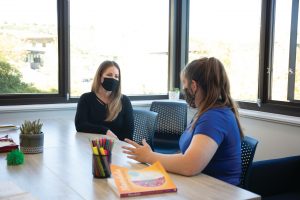
Erika Pike
Student Support Specialist
Pacific Ridge School
As we approach the new school year, many parents are wondering how their children will fare academically after more than a year of remote learning. It is natural to worry that your child has fallen behind.
Abundant research confirms that mental health and social emotional wellness are closely linked with learning outcomes. Students who experience positive mental health are better able to learn, face challenges, and build healthy relationships. At Pacific Ridge School, our Student Support Team is structured by this knowledge; each of our counselors provides support for both academic functioning and social-emotional wellness for students who need it. The two go hand in hand.
The pandemic has affected both academic learning and emotional wellness for children throughout the world. Anxiety and depression have risen significantly as children have faced isolation, concern over their family’s health, and a lack of predictability in their lives. Students from low-income communities have been disproportionally affected.

support planned by your school.
In this context, some learning regression is real for many students. Schools understand this and are building additional scaffolding into their curriculum to help bring students up to speed. For most children, this added classroom support is all they will need. For some, additional remedies may be called for. Before signing your child up for summer classes, I recommend that you consider the following:
- Talk to your child’s teachers. They are the best equipped to assess if your child is likely to bounce back from any learning loss with the resources and support planned by your school. Trust their experience and knowledge of how your child learns.
- Make sure that social interaction, relaxation, physical activity, and play are a big part of your child’s summer. After such a long time separated from others their age, children are craving social time with their peers, and their emotional health is depending on it.
- If you find out that some academic brushing up might help your child, be sure to balance it with an abundance of free time and opportunities for healthy play. Students who feel emotionally refreshed when they enter school in the fall will likely fare better than those who have been academically “prepped,” but have not been able to recover from pandemic-related stresses. The mental health and wellbeing of students needs to come first.
- Support at home can benefit any child. Reading to your children holds academic benefits and fosters closeness while letting them relax. Making a fun game out of anything you are doing at home can teach valuable, stress-free lessons. Asking your children how they are feeling and letting them know you hear them will help ease their minds.
The bottom line is that kids are resilient, and it can be typical to have interruptions in learning for various reasons. The good news is that we are all in this together and our children’s education will resume soon. This summer is a great opportunity to bond with our children, understand what they are experiencing, and through that, help them heal.
